




By DONNELL SUGGS
There are family pictures. And then there are generational family pictures. 103-year-old Annie Velma Hickson sat in her favorite love seat in the living room of her home in Southwest Atlanta. The Fayette County native smiled as members of her direct lineage closed in around her.
Some stood, others kneeled, and others still sat on the arm of the chair. There were many people in the photo on the afternoon of Friday, May 30. In the photo were three generations of the family: Hickson’s son Tommy Hickson, 72, and daughters Diane Hickson, 75, and Joann Goodman, 70; oldest granddaughter DeAnn Richie, 55, and oldest grandson Theodore Hickson, 60; and other grandkids: Rodrick Hickson, 58, Hubert Hickson, Jr., 57, Andre Hickson, 54, and Lakunta Jenkins, 48.
The photographer asked the family to look in her direction and smile, but before she could frame this moment forever, another of Hickson’s grandchildren entered the home. Demetrice Jenkins, 50, owns a restaurant, Hibachi on Cascade, and visits his grandmother often. When he stood next to his sister, Lakunta, it was finally time for the photo.
“This is a blessing,” Demetrice said of having his grandmother here to witness moments like the one that just took place. “It’s a blessing by the best for the best.”
With her 104th birthday just around the corner on June 10, Hickson expects more gatherings like this one, but larger. There are 19 grandchildren, 31 great-grandchildren, and 13 great-great-grandchildren that have spun from the eldest Hickson. Her oldest son, Leroy Hickson, 80, passed away in January.
“It means a lot to me. They treat me nice, and I treat them nice,” Hickson said of her family. “But they know I don’t take no junk.”
The living room, now full of people, filled with laughter, following that statement from the family matriarch. The unanimous reaction to what Hickson said was proof that she was telling the truth.
“She is a strong woman,” said Tommy of his mother. “She took care of herself and took care of us.”
Of his mother’s life and times, he said, “It’s been a blessing.”
Big families have always been a part of Hickson’s story. Born in 1921, Hickson was one of 24 children from her father. She birthed 12 children of her own and has outlived all but four of her progeny. Her other son, Homer Lee Hickson, 72, lives and works in Central America. There are plans for him to be home in Atlanta for his mother’s birthday party on Saturday, June 14. Despite living and working all over the world, Homer makes sure to visit his mother several times a year.
“She’s the head of the family. She’s the rock,” said Homer.
Even though the party will be a celebration for Hickson, she will most likely cook
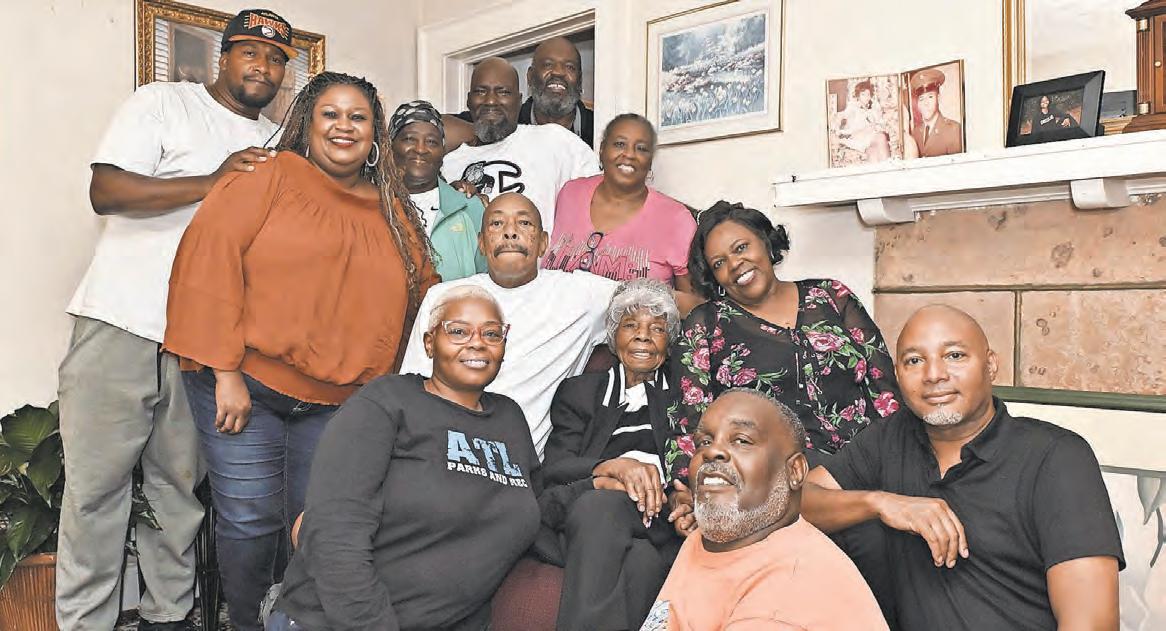
something for the guests. When told that she recently baked a pound cake, Homer, who said he still enjoys eating his mother’s cooking, said, “She’s always doing something.”
Along with her annual birthday celebrations, multiple generations of the family get together for Easter, Thanksgiving, and Christmas celebrations. Hickson said she wouldn’t have it any other way.
“We always did have a good time together,” Hickson said of raising her children and grandchildren in the same house for the past 54 years. “We had a home full of people all the time.”
Hickson recalled times when her kids and her sister’s kids would come home from school and the house would be full of school-aged children. Her house, which is located in the historic Cascade neighborhood, was the neighborhood house. The one that local kids would visit and their parents knew was a safe haven.
“This was a house full of children, and I didn’t mind,” Hickson said. “I enjoyed raising them.”
A lover of flowers, Hickson was asked what her favorite flower was and before she could answer, the entire house answered for her.
“All of them,” they could be heard saying in unison.
Hickson said she is enjoying her life and still enjoys doing many of the things she once did for fun, such as cooking, tidying up around the house, and reading her Bible.
“I cook a lot, I hop around on that stick when I feel like it and I get to cooking,” Hickson said of the black cane she uses to get around the house.
There is one thing she misses, though.
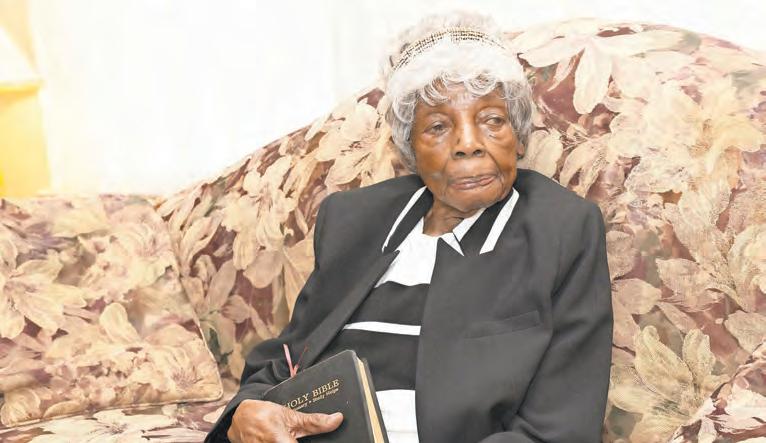
“Getting out in the yard and planting flowers. I can’t do that anymore,” Hickson said.
According to Hickson, her faith is the primary reason for the blessing that is longevity of a life that has spanned a century. Holding her Bible in her hands during the photoshoot for this story, Hickson spoke of believing in God and raising her children with the Golden Rule in mind.
“Raise your children, don’t let your children raise you,” she said.
As for advice on living a long life, Hickson said she doesn’t get angry because it’s not worth it.
“I would tell people to try not to get mad. You have to be careful with people these days,” she said.
Surrounded by family, Hickson smiled for more photos and laughed when her children and grandchildren shared more stories about her. She was right where she belonged.
“She is the boss. She is the matriarch of the entire family,” Andre said. “When she speaks, everybody listens.”
Seasoned Saints is a dynamic storytelling series spotlighting Atlanta’s senior trailblazers—individuals who have helped shape the city’s identity through media, activism, culture, and leadership. These stories honor the everyday makers of Black history—not just during Black History Month, but all year long. Some of these remarkable individuals are globally recognized, while others are cherished names within their local neighborhoods.
By ISAIAH SINGLETON
The Metropolitan Atlanta Rapid Transit Authority (MARTA) is gearing up to welcome soccer fans from around the world for the 2025 FIFA Club World Cup, one of this summer’s most anticipated global sporting events.
With decades of experience moving large crowds safely and efficiently, MARTA stands ready to transport fans to these high-profile matches.
“MARTA is one of the only transit systems in the world that offers direct access to the airport, with a train station inside the concourse,” MARTA General Manager and CEO Collie Greenwood said.“Soccer fans can go from the plane to the train to their hotel seamlessly and let MARTA drive them easily to and from the matches and other Club World Cup festivities around the city.”
Greenwood said MARTA has a strong record of accomplishment supporting high-profile sporting events. From three Super Bowls, College Football Playoff National Championship games, and NCAA Final Four matches to regular Falcons, Hawks, and Atlanta United games, MARTA consistently proves itself as the backbone of Atlanta’s event infrastructure and is,
for many, an essential part of the gameday experience.
As it does for all major sporting events downtown, MARTA will beef up operations.
For the six Club World Cup matches this summer, MARTA will run added trains before and after the games, including a pre-game shuttle train that will run between Five Points and GWCC Stations.
For the latest information, visit MARTA’s FIFA Club World Cup 2025 page here.
Additionally, MARTA Transit Ambassadors will be stationed throughout the system to aid customers, Load and Go teams will be on rail platforms to help move passengers on and off trains, and MARTA Police officers will be deployed systemwide to ensure a safe and secure ride. Below is the schedule of matches set to take place at Mercedes-Benz Stadium this summer:
Monday, June 16, 3 p.m.: Chelsea FC (England) vs. LAFC (United States)
Thursday, June 19, 3 p.m.: Inter Miami CF (United States) vs. FC Porto (Portugal)
Sunday, June 22, 9 p.m.: Manchester City (England) vs. Al Ain FC (United Arab Emirates)
Sunday, June 29, 12 p.m.: Round of 16 match
Tuesday, July 1, 9 p.m.: Round of 16 match
Saturday, July 5, 12 p.m.: Quarterfinal match

Also, the Five Points Transformation Project will have no impact on transit service for Club World Cup, according to MARTA. All rail service and rail transfers will run as scheduled and street-level access to the station and downtown bus service is available on Forsyth Street.
Planning is also well underway for the 2026 FIFA World Cup, with MARTA preparing to expand service to accommodate the expected influx of visitors for the eight matches hosted in Atlanta.
MARTA is actively engaged with FIFA, the Atlanta Sports Council, and is a participating member of the multi-agency FIFA World Cup Coordination Group, which includes transit agencies from all host cities. This collaboration allows for strategic planning on critical issues such as budgeting, safety, and volunteer deployment.
MARTA will also roll out its better Breeze fare payment system before the 2026 FIFA World Cup. With this upgrade, customers will be able to tap their credit cards, smartphones, or smartwatches to pay their fare, making it especially convenient for visitors.
Atlanta’s World Cup celebration extends beyond the stadium. The City of Decatur recently announced a monthlong Decatur
WatchFest26, conveniently located above Decatur rail station. MARTA will be the ideal way for fans to access WatchFest26 and other regional fan events throughout the tournament. Let MARTA drive you to Club World Cup matches and events:
Take the train to GWCC or Vine City Stations for direct access to Mercedes-Benz Stadium, the Home Depot Backyard, State Farm Arena, and GWCC.
Customers can access the all-new trip planner to find real-time bus and rail arrival and trip cancellation information. Download the MARTA On the Go app and follow @MARTAservice on Twitter for real-time service alerts. Download Breeze Mobile 2.0 to purchase fare directly on your phone and skip the line at the Breeze vending machines. Download See & Say 2.0 to report suspicious activity. Check rail station parking availability.
Public restrooms are available at 16 rail stations. SMART restrooms are open from 6 a.m. to 10 p.m. at Decatur, Doraville, East Point, H.E. Holmes, Lindbergh, and GWCC rail stations.
Due to construction, Five Points Station may be accessed on Forsyth Street only. Restrooms and customer services at Five Points are temporarily closed.

By DR. BENJAMIN F. CHAVIS JR.
For decades, The Skanner ne wspaper in Portland, the Portland Observer , and the Portland Medium have served Portland, Oregon’s Black community and others with a vital purpose: to inform, uplift and empower. But legislation now moving through the Oregon Legislature threatens these community news institutions—and others like them.
As President and CEO of the National Newspaper Publishers Association (NNPA), which represents more than 255 Black-owned media outlets across the United States—including historic publications like The Skanner, Portland Observer, and the Portland Medium —l believe that some Oregon lawmakers would do more harm than good for local journalism and community-owned publications they are hoping to protect.
Oregon Senate Bill 686 would require large digital platforms such as Google and Meta to pay for linking to news content. The goal is to bring desperately needed support to local newsrooms. However, the approach, while well-intentioned, puts smaller, community-based publications at a future severe financial risk.
We need to ask – will these payments paid by tech companies benefit the journalists and outlets that need them most? Nearly half of Oregon’s media outlets are now owned by national conglomerates with no lasting investment in local communities. According to an OPB analysis, Oregon has lost more than 90 news jobs (and counting) in the past five years. These were reporters, editors, and photographers covering school boards, investigating corruption, and telling community stories, until their jobs were cut by out-of-state corporations.
Legislation that sends money to these national conglomerate owners—without the right safeguards to protect independent and community-based outlets—rewards the forces that caused this inequitable crisis in the first place. A just and inclusive policy must guarantee that support flows to the front lines of local journalism and not to the boardrooms of large national media corporations.
The Black Press exists to fill in the gaps left by larger newsrooms. Our reporters are trusted messengers. Our outlets serve as forums for civic engagement, accountability and cultural pride. We also increasingly rely on our digital platforms to reach our audiences, especially younger generations—where they are.
We are fervently asking Oregon lawmakers to take a step back and engage in meaningful dialogue with those most affected: community publishers, small and independent outlets

and the readers we serve . The Skanner, The Portland Observer, and The Portland Medium do not have national corporate parents or large investors. And they, like many smaller, community-trusted outlets, rely on traffic from search engines and social media to boost advertising revenue, drive subscriptions, and
raise awareness.
Let’s work together to build a better future for Black-owned newspapers and community journalism that is fair, local,l and representative of all Oregonians.
Dr. Benjamin F. Chavis Jr., President & CEO, National Newspaper Publishers Association
FOUNDED May 11, 1966
FOUNDER/EDITOR
Ed Clayton Immortalis Memoria
PUBLISHER/EDITOR
J. Lowell Ware Immortalis Memoria
The Atlanta Voice honors the life of J. Lowell Ware.
PUBLISHER
Janis Ware
PRESIDENT/ GENERAL MANAGER
James A. Washington 2018-2024
EXECUTIVE ASSISTANT TO PUBLISHER
Chia Suggs csuggs@theatlantavoice.com
EDITOR IN CHIEF Donnell Suggs editor@theatlantavoice.com
GENERAL ASSIGNMENT REPORTERS
Isaiah Singleton isingleton@theatlantavoice.com
Laura Nwogu lnwogu@theatlantavoice.com
EDITOR AT LARGE Stan Washington swashington@theatlantavoice.com
MANAGING EDITOR, DIGITAL Itoro Umontuen iumontuen@theatlantavoice.com
ADVERTISING, SALES & CIRCULATION
ADVERTISING ADMINISTRATOR
Chia Suggs advertising@theatlantavoice.com
CIRCULATION MANAGER
Terry Milliner
SUBMISSIONS editor@theatlantavoice.com
DIRECTOR OF PUBLIC RELATIONS
Martel Sharpe msharpe@theatlantavoice.com
CONTACT INFORMATION
633 Pryor Street, S.W. Atlanta, GA 30312 Office: 404-524-6426 info@theatlantavoice.com

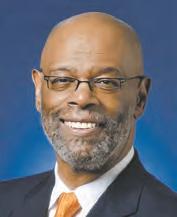
BY JAMES A. WASHINGTON
The Atlanta Voice
There are times when you hear very powerful words in the flesh, and the impact is felt in the spirit. So, this morning, while I was channel surfing, I came across a minister whose name I can’t remember but whose message still resonates in my head. If faith comes by hearing, then listen to this. He said that for somebody to hurt you, they have to be close enough to kiss you. WHOA!!! Beyond the biblical reference to Christ and Judas, the reality of that statement should have many of you shouting now. It certainly had me sit up and take notice. Real pain usually comes from those people, places, and circumstances you care about. When your guard is down and you feel safe, you allow others to see you up close and personal. At these times, life teaches us that the kiss of death is real. Many of us, including me, are bleeding right now only because someone from our past knew the exact spot to stick the proverbial knife. Now that’s real pain because it was unexpected pain. It’s ironic to me
The world should see Christ in us because we shout by who we are that we know whose we are
that a true Christian should let the external world see the internal soul. The world should see Christ in us because we shout by who we are that we know whose we are. Irony might not be the best word to describe this, but the truth is that the ultimate kiss was a kiss of betrayal. The difference between me, you, and Christ Jesus is that He knew it was coming. He needed it to fulfill His divine mission. We’re blindsided by kisses that we should have seen coming all along. Think back for a minute to that devastating kiss in your own life, and I’ll assume that if you were rooted in faith, then the effect and aftermath should give us what it gave Jesus. I think it’s called testimony. The real trials and tests and
“YOUR VOICE”
temptations that I’ve survived have all led me to be able to testify to the truth of the gospel because, without that truth, I’d be dead spiritually by now, as would you. Instead, I’m here to testify that God is real because of all He’s done for me, despite all the sanctimonious, serpentine, sometimes self-inflicted kisses I’ve received. Now, if the truth be told, I probably asked for them, by my behavior, denial, or even my desires. But the good news is it doesn’t matter anymore because, like Christ, I think I can see Judas coming. I’m not sure, as Christ was about needing to be kissed to fulfill the terms of the new covenant. But I’m sure my kisses are supposed to have a very positive effect on my testimony.
I believe that for all we have been through, if we can somehow reconcile the impact it has had on us with God’s purpose, then the best is yet to come. All we have to do is learn from it with the same perspective we now know Christ had. The betrayal was part of the plan. Everything after that tells us more about Jesus than maybe some of us want to admit. After all, we’ve all had to rise from the ashes of our own making when our Judases kissed us.
May God bless and keep you always.
This column is from James Washington’s Spiritually Speaking: Reflections for and from a New Christian. You can purchase this enlightening book on Amazon and start your journey toward spiritual enlightenment.

What are your thoughts on having a work requirement attached to a person’s eligibility for Medicaid?
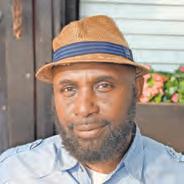
BYRON REESE Conyers
“My personal belief with Medicaid is that when someone is disabled and can’t work, you shouldn’t hold it against them. However, there should be some guidelines for the individuals who are perfectly capable of working. So, it’s a double-edged sword, but for the individuals who are disabled and can’t work, it should be up to our government to step in and take care of them.”
Compiled by Vincent Christie

“I don’t think there should be a work requirement for Medicaid because health is a human right. It should be for everybody, and I believe that every state, including Georgia, should expand Medicaid to meet the constituents’ needs, so that people have more opportunities and can access healthcare systems. There should not be a barrier to healthcare. So, expand Medicaid and make it available to everyone without a work requirement. It is a human rights issue.”
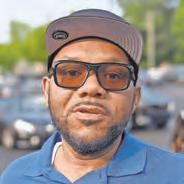
“I think all American citizens, all citizens of Georgia, should have Medicaid, period. Whether you work or not, children, older adults, women, men, and the physically disabled should all have Medicaid. Because I think that’s a God given right. Everybody should be able to have medical treatment.”


“As far as I am concerned there should not be a work requirement for Medicaid, simply because a lot of people are taking different routes, a lot people are entrepreneurs, a lot a people are striking on their dreams and at that point if they’re not ready or they don’t have any evidence of profit or evidence of payment, then I don’t think they should be restricted to not having medical care. It sounds like a slippery slope, but I sincerely think it should not be a work requirement for Medicaid.”
“I do not believe that people who require the assistance of Medicaid should have to work for it because some of them are quite severely disabled, so how would that make sense? Medicaid should be an option for those who need it. We pay taxes so that people who need Medicaid can use those services. So, I am not for people working to receive the benefits of Medicaid.”
By DONNELL SUGGS
The would-be politician and Georgia gubernatorial candidate was in a rush. He was on his way to a campaign event in South Georgia, but first, he had to drop by a local newspaper for an interview. Olu Brown, the former lead pastor and founder of Impact United Methodist Church, wants to be the next Governor of Georgia, and his plan is simple: “I want to see all people, I want to see all Georgians,” Brown said.
A father of two, Brown explained the mission of his early campaign stops. “I want to be the voice of a new vision that represents all of Georgia, not only metro Atlanta, but up into the mountains north of us, middle Georgia, south Georgia, and coastal Georgia.”
“Our approach is a little bit different from most politicians,” Brown said.
Brown, who was making the 200-mile drive to Baxley to speak with potential voters on Monday, wants to offer people another option for leadership despite never having held a political office- local or national- in his life. Despite what many may believe are limitations for running for the highest political office in the state, Brown considers his being a novice an advantage.
“I believe as a faith leader, as a small business owner, and as a community activator, my history and my current skill set makes me the best candidate to be the next governor,” he said.
Brown told The Atlanta Voice that he has already held 30 listening sessions like the one he was headed to that afternoon.
Growing up in the small east Texas town of Lufkin (population: 34,181), Brown feels his small town roots can help him reach and relate to voters that might not get the attention voting communities in Fulton, DeKalb, Cobb, and even Clayton, Hall, Gwinnett, and Chatham counties receive during statewide election seasons.
“We have been spending a lot of time in south Georgia, but we have also been spending a lot of time in metro Atlanta,” Brown said.
Days earlier he spoke to a small group of voters during a listening session in Cobb County. The number of people in the room was 20, but Brown said he felt it necessary to speak to them despite the fact that Democratic nominees for governor have rarely if ever made any headway in Cobb County, for example.
“I’m a versatile candidate, I can adapt, and I like and love all people,” he said. “This is a natural space for me. This is a job that I think I am best fit for, but it also means I can focus on all Georgians, no matter where they are.”
Brown added that Georgians of all races, religions, and incomes deserve a candidate who best respects their concerns, such as healthcare and job opportunities.
As a pastor of what started as a small congregation and grew into a megachurch, Brown believes his experience as a faith leader can help ease concerns about his lack of experience as a politician. In fact, he believes it gives him an advantage over other, more well-known candidates.
“Our budget when I retired was $4 million
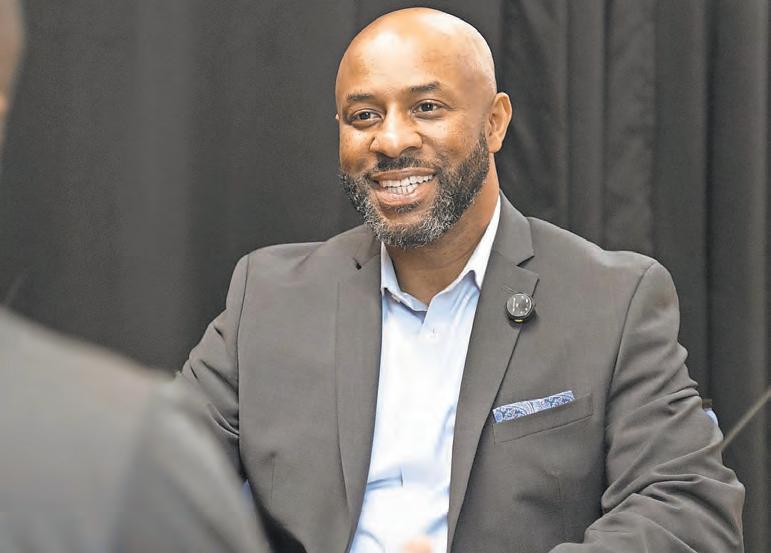
“I’m a versatile candidate, I can adapt, and I like and love all people. This is a natural space for me. This is a job that I think I am best fit for, but it also means I can focus on all Georgians, no matter where they are.”
per year. Payroll alone was $2 million a year and that will wake you up before your alarm clock,” Brown joked about the responsibility. “A lot of the candidates don’t have the business experience; they have never started anything, and they don’t know how to scale anything. I’ve gone from the ground up to starting something that is successful. I think the next governor of Georgia needs to have that skill set, and that’s what I have.”
Brown said the next governor of Georgia needs to have a people mindset and a collaboration mindset in addition to the business mindset in order to lead one of the largest statewide budgets in the country.
“As a person of faith, I always lead with loving your neighbor, and that helps everybody, and that’s the leader I’ll be as the next governor,” Brown said.
Rental car keys in hand, Brown headed outside to take more photos and continued speaking about his campaign. A graduate of Jarvis Christian College in Hawkins, Texas, and Gammon Theological Seminary of the Interdenominational Theological Center in the Atlanta University Center, where he earned a Master of Divinity degree, he speaks in a clear tone and with purpose. Talking to hundreds of people multiple times per week as a pastor has prepared him to answer questions on the fly while maintaining a cool but serious demeanor.
“As a faith leader, I see people even when other people don’t, I care about them, and what I have been telling folks is they won’t have to come to the State Capitol to see me, I’ll be in their city,” Brown said.
Brown said he understands the state of Georgia doesn’t start and end with Atlanta. His small-town roots and faith connections
“In order to have had the career that I had

at a local church, and had the success that we had, you had to build bridges throughout metro Atlanta and rural Georgia,” Brown said. That says I am a flexible, versatile candidate. Wherever you put me in Georgia, I’ll be OK.”
He believes there is no better time to strike than now with everyday Americans, and in this case, Georgians, turning away from who he called, “Career politicians.”
“Career politicians have to explain why some of our cities are in the state that they are in, why education is in the state that it’s in, why with a state with a $16 billion-dollar surplus, you still have people who don’t have access to healthcare and if they do they can’t afford it,” he said. “People are looking for disruptors, people are looking for outsiders, but with a skill set to make a change.”
Many of the questions Brown said he gets from Georgians during these listening sessions are familiar to him from his time as a pastor.
“You don’t grow a church to thousands without having constituents from every generation,” Brown said.
He plans to make sure seniors are not overlooked during his campaign, calling seniors “the wisest people that we have.”
“As a governor, I realize that you’ve got to build teams of wise people, and guess what, seniors will be at the table,” Brown said. Brown said his campaign will be making stops in north Georgia and coastal Georgia
“This is about having a candidate who sees all people and all Georgians,” Brown said. “We’re lifting Georgia higher.”
By ITORO N. UMONTUEN
Monday morning, Geor-
gia State Representative Dr. Jasmine Clark announced her intentions to run for Congress. The microbiologist and college professor will challenge U.S. Rep. David Scott in Georgia’s 13th District. Dr. Clark has represented Lilburn in Georgia’s House of Representatives since 2018.
During her time in the Legislature, Clark has been an outspoken advocate for education, healthcare, and voting rights. She represents portions of Gwinnett County that is the current epicenter of battleground Georgia.
“I first decided to run for state house in 2018, after Trump’s first election, to be a science voice for Georgia. I’ve served in the minority in the State House, and I know what it takes to fight Republican attacks on our community. When Kemp and Georgia Republicans distorted facts and manipulated data to push their radical agendas, I exposed the truth,” said Clark.
Clark’s Opposition
One of Clark’s opponents is incumbent U.S. Rep. David Scott. Within Democratic circles, Scott’s age, rumored acuity, plus insufficient visibility within the district has raised questions about his viability. Scott, turns 80 this month and has served in Congress for 24 years. Everton Blair, the former chair of the Gwinnett County Board of Education and prominent businessman State Sen. Emmanuel Jones are Clark’s opponents.
“These are not normal times, and I cannot sit back and watch my community come under attack while our leaders in Washington fail to show up. I’m running for Congress to be a fighter for Georgia families, science and reason,” said Clark.
A graduate of the University of Tennessee, Clark earned her Ph.D. in Microbiology and Molecular Genetics from Emory University and completed a postdoctoral project in HIV research. She currently serves as an Assistant Professor of Biology, working with undergraduate, graduate, and postdoctoral students.
Clark has seen her district be targeted by Governor Brian Kemp twice in the last four years. She has raised considerable amounts of money to fend off Republican challenges for her seat. Moreover, Clark has a strong base of support.
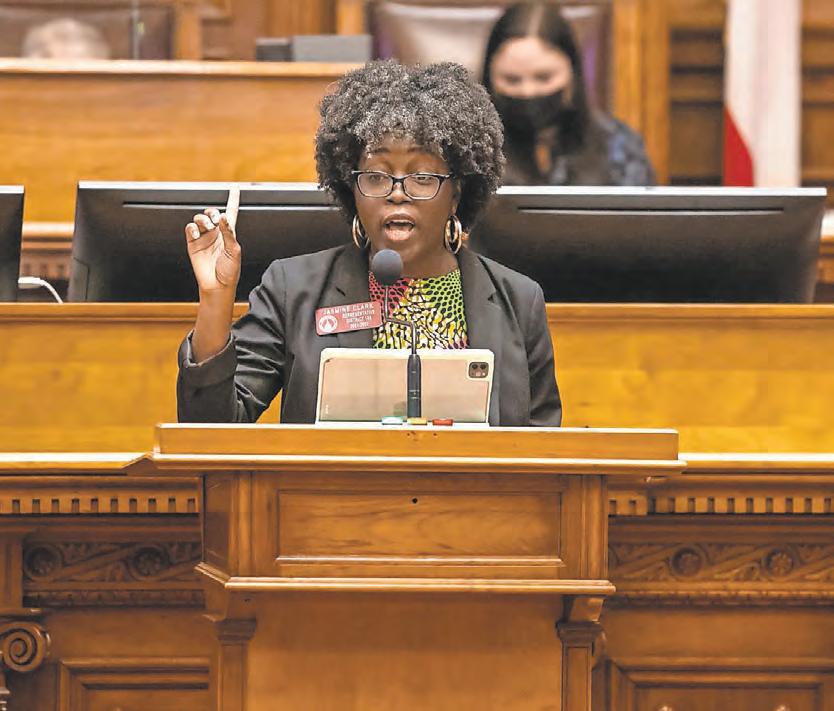



By NOAH WASHINGTON
“Tonight is about impact,” said Good Trouble Gala host Karyn Greer.
On Thursday, May 29, the John and Lillian Miles Lewis Foundation hosted its annual Good Trouble Gala at Flourish Atlanta, celebrating the enduring legacy of the late Congressman John Lewis and his wife, Lillian Miles Lewis. The event opened with attendees walking into the ballroom to the sound of the Ebenezer Baptist Church Choir. Presenters included U.S. Rep. Nikema Williams, Henrietta Antonin, and Carolyn M. Young, among others.
Atlanta Mayor Andre Dickens, who served as an honorary co-chair, reminded attendees of Lewis’s national importance.
“Congressman Lewis was not just the conscience of Atlanta; often, he had to be the conscience of our country. We need him right now,” Dickens said. Reflecting on Lewis’s broader legacy, he added, “He may have been Troy, Alabama’s gift to Atlanta, but he was Atlanta’s gift to the world.”
The gala honored Secretary Lonnie G. Bunch III, head of the Smithsonian Institution, and Billye Suber Aaron, a former TV personality and philanthropist who is also the widow of baseball legend Hank Aaron.
“On occasions, he would stop by our home, and I remember asking him, ‘John, do you ever smile?’” Aaron said, recalling her friendship with Lewis.
U.S. Sen. Jon Ossoff reflected on his relationship with the congressman, describing what it meant to be in the presence of such rare leadership.
“You knew you were in the presence of greatness—not just historical or political greatness,
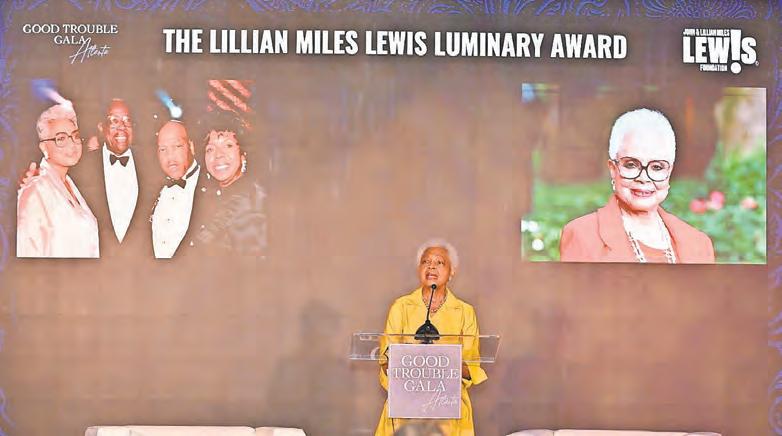
but spiritual, human greatness,” Ossoff said. “You could feel his decency, his empathy. It poured out of him.”
The year 2025 marks what would have been Lewis’s 85th birthday, a timely reminder that his call to action endures. Williams, who now holds Georgia’s 5th Congressional District seat, told attendees, “Congressman Lewis was more than just a civil rights icon to me. He showed up—for the people, for the causes, for the fight.”
The Foundation’s mission, to advance civic engagement and build the “beloved community”, was evident throughout the night. The gala recognized recipients of the Good Troublemaker Neighborhood Grants, which support local leaders continuing the Lewis legacy.
“Your time is now,” Williams told the young changemakers in the room. “Not someday,
now. Use your voice, your education, your seat at every table to bring others with you.”
Ossoff, echoing the theme of perseverance, described Lewis as a “legendary fighter.”
“He used all the tools of nonviolent resistance to fight for justice,” he said. “And my goodness, would Congressman Lewis have loathed and opposed and fought what is being done to this country right now.”
The event also featured the announcement of the Foundation’s Good Troublemaker Scholarships, awarded to graduating seniors entering college who exemplify the spirit of “good trouble.” Ossoff called their achievements living proof of Lewis’s enduring impact.
The night concluded with a preview of the Foundation’s upcoming hip-hop musical, Young Jon Lewis.
Founded by Lewis himself, the Foundation

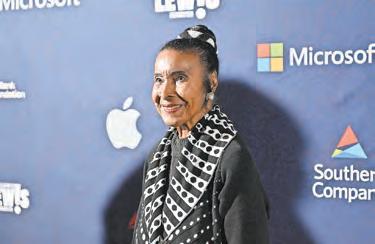
continues to champion civic engagement, justice and education in pursuit of his vision for a more equitable society. And in the year that would have marked his 85th birthday, the work continues—stronger than ever.
As Ossoff closed his remarks, he captured the spirit of the evening: “Thank you for being here to honor their legacy. Thank you for everything you do, for the state, for the nation and for the world.”
By LAURA NWOGU
When living in the city, the discussion of “new Atlanta” and “old Atlanta” is hard to escape. However, at 404 Coffee, a café located in the historic Black Pittsburgh neighborhood, that debate is put to rest as owner Kelli Jones pays homage to all Atlanta’s culture has to offer, one cup of coffee at a time.
“My main focus in opening up this coffee shop was to enrich this neighborhood,” Jones said. “I was born and raised over here — legacy resident — and I love the community. I love what we stand for and what we can be, and I see the growth in the city; I want us to be a part of it in a nostalgic way.”
That nostalgia hits you as soon as you enter the intimate space that reads like a love letter to the city. Plastered from wall to wall are pictures of the past, from Club 112, My Brother’s Keeper Entertainment Complex, and Golden Glide to well-known celebs and Atlanta figures drinking coffee alongside iconic images such as the Atlanta Falcons logo, street signs, and peaches galore.
For Jones, it was important to create a community hub where locals and tourists could fellowship, network, and connect while also reminiscing. As a native resident of the Pittsburgh neighborhood, she has seen the city’s changes first-hand. When she opened 404 Coffee in June 2022, her intent was to infuse the parts of the old and the new that people have come to love.
While doing that, she wanted to preserve its history in a creative way. In an area welcoming new development and revitalization, 404 Coffee ties the past to the future of the South Atlanta neighborhood, cultivating growth while keeping the culture intact.
When patrons order a coffee, the cup sizes range from Zone 1 (small) to Zone 3 (large). From specialty drinks named ‘96 Olympics, Freaknik, and Memorial Drive, lattes dedicated to Peters Street and Old Nat, a dragon fruit refresher named The BeltLine, and hot food items named after areas such as Bankhead, Midtown, and Ashby, Jones’ admiration of the city’s culture bleeds through.
“When building the menu out, it was just more about Atlanta and what I remember and what made me feel good about the city. Everybody across the world knows Bankhead; Bankhead stands for something. But, they’re changing the [street] names, so it’s like losing


the history. So, why not incorporate those in and still let them know we have an Ashby and a Joseph E. Boone?
“It means so much more to us than changing the street names and gentrifying the area. I love growth. I want the best of the best, too. But just remember that, without a Bankhead or Stewart Avenue, it would be no Metropolitan Parkway, it would be no BeltLine, it would be no West Midtown.”
For many Black-owned coffee shops in Atlanta, the idea of a café goes beyond coffee, and it’s no different with 404 Coffee. Jones said they often host community events and work with the City of Atlanta to support youth and provide direct-hire jobs. They also partner with foster care to create spaces where the youth can be seen and heard.
In the future, Jones hopes to bring the 404 experience to spaces such as the Hartsfield-Jackson Atlanta International Airport, Centennial Yards, and Mercedes-Benz Stadium.
“It’s been wonderful just creating that community space for people. I feel like, whether you just come in here for a hot second, you still want to feel that southern hospitality, that warmth that comes in.”

By NOAH WASHINGTON
Social media creators Jamal “The Creative” Morant and Chantelle “Chantelle Rose” Morant, known across platforms as “The Creatives,” describe their relationship as years in the making, with their paths crossing long before they officially met.
The couple, who now produce sketch comedy content together, later discovered they were in the same theater for the Black Panther premiere in Atlanta in 2018, though they didn’t meet that day.
“We were in the same room. She was with her whole family and her ex-fiancé at the time.
I think I just went by myself,” Jamal said. “I had never seen her, or maybe I saw her, but I never thought anything of it.”
Their story continued with shared life experiences. Both ended engagements around the same time and spent three years on what they call a “healing journey” before connecting on a dating app in late 2022.
“I was very sporadic on that dating app,” Chantelle said. “It was kind of just on a whim. Sometimes I would go on there, might swipe right on some people, but then not even go back to see if they responded.”
The relationship progressed quickly. Jamal asked Chantelle to be his girlfriend on Jan. 29, 2023, less than a month after their first date. They began traveling extensively, visiting Disney World, Paris, Amsterdam, Portugal, and Belize within their first six months together.
Their content creation journey began gradually, initially filming videos during their travels. By late 2023, they pivoted toward shortform content, focusing on sketch comedy for Instagram and other platforms.
“I felt so awkward at first because I came from film and television acting, which is so different than social media content,” Chantelle said. “TV and film acting is in the subtleties and small details, but for Instagram and YouTube, I had to over exaggerate.”
Their breakthrough came with what they now call their signature “hoodie” video, a comedic skit in which Chantelle takes Jamal’s hoodie while he’s wearing it and runs away. The video garnered 35 million views in a month, setting a new creative direction.
“I was like, ‘You know what, Chan, I’m about to just double down on short form and Instagram, and I promise you, within a month, we can take off,’” Jamal recalled.
Before they focused on joint content, Jamal carried about $18,000 in monthly business expenses as “Jamal The Creative,” which included costs for videographers, actors, websites and production.
“All of 2023 was a wreck,” he said. “I was panicking and freaking out, wondering, ‘Is this sustainable? Is this something that we can do?’”
Despite the uncertainty, the couple committed to building a brand together, particularly as the industry leaned toward short-form content as a gateway to longer formats.
Their career took a major step forward after signing with People Store—now Formation Agency—in March 2024. Their manager, Ashley, helped them better understand their value.
“Our previous manager told us we couldn’t get more than $2,000 for a brand deal,” Chantelle said. “We got a Black woman as our manager, and she’s getting us $30,000.”
That summer, they closed multiple deals, including one worth $35,000. During a 12-hour flight to Japan, they negotiated four brand deals.
“I think we made over $100,000 in like two months’ time,” Chantelle said.
Their brand deals typically include deliverables such as one video for TikTok and Instagram, plus several story posts. Agencies often propose compensation that must be negotiated.
“One video for us costs $20,000,” Jamal said. “They’ll come and be like, ‘Well, we’ll pay you $15,000,’ and then we’ll be like, ‘We’ll do $25,000.’”
They also navigate payment terms that follow net-30, net-60 or net-90 schedules, meaning income may not arrive until months after the work is completed.
Although brand deals brought in significant revenue, Jamal knew they couldn’t rely on them alone.
“I knew that brand deals weren’t it,” he said. “I don’t want to depend on them to be our financial support.”
They explored long-form content but found the process—especially editing—to be tedious. In December 2024, Facebook updated its monetization model to support short-form creators, offering a new path forward.
By posting four to 10 pieces of content per day—including reels, carousels and older content—they created a stream of reliable platform revenue.
“Just doing that every single day started allotting us the money from the platforms to be able to actually be sustainable,” Jamal said. “Now the brands are just a bonus.”
Platform Diversity and Representation
Beyond Facebook, they also earn revenue on YouTube, where they work with Culture Genesis, a company representing Black creators such as Kai Cenat and Steve Harvey.
“They make sure that Black creators on

YouTube are represented properly and get the money they deserve,” Jamal said, citing compensation disparities between Black and white creators.
On the potential TikTok ban in early 2025, Jamal expressed mixed feelings. While not a primary income source, TikTok’s competition helps keep other platforms accountable.
“We need TikTok to stay so you can force people like Facebook to pay their creators,” he said. “You need them for YouTube to stay on top of their game and make it more organic.”
Chantelle added that TikTok is essential for exposure: “I feel like TikTok is the best platform for getting your content out there and being seen.”
Their monthly platform revenue varies widely. “There’s been some months where we’ve made like $50,000. There’ve been months where we made $7,000,” Jamal said.
On April 1, 2025, the couple committed to creating content exclusively under their joint brand.
“I was like, what if we just go all in on us?” Jamal said. “Let’s just 1,000% do us. And since that day, everything has taken off.”
They now film four videos on weekdays and two on weekends. Upcoming trips, including a honeymoon to Africa, will double as content opportunities.
The couple recently moved from a cramped two-bedroom apartment where one room was filled with merchandise.
“We had nowhere to put stuff,” Chantelle said. “We just completely outgrew the space.”
Looking ahead, Jamal sees content creation as a lifelong pursuit: “I can do content until I die because I love it.”
Chantelle, while passionate, envisions evolution: “I don’t anticipate our future looking like how it does now. I don’t anticipate still filming and putting out four videos a day when I have a newborn.”
They are working to expand their brand beyond social media. Chantelle is writing a children’s book, and both hope to host charity events, community panels and a podcast.
“I want to expand what we’ve done with the skits and short-form content and go beyond that into our community,” Chantelle said.
Jamal added: “I want every Black person in Atlanta to know who we are. That’s my next goal, broadening and making the brand bigger.”
The couple is often recognized in public, even internationally. During a layover in Malaysia, an airport employee reenacted one of Chantelle’s skits.
“That was probably the moment that I was like, ‘Oh my gosh, people really watch us,’” Jamal said.
Some fans have been brought to tears during meet-and-greets. One woman said their content inspired her to start dating her husband again after 20 years.
“It feels like what we started this for is impacting people,” Jamal said.
When asked how much of their content reflects their actual relationship, Chantelle said, “It is all true. It’s just more dramatized.”
Jamal estimated that 80 to 90 percent of their content is based in reality.
“We created the brand because we don’t see enough depiction of Black, successful relationships in media and in a healthy way,” he said.
Chantelle cited that their audience is primarily Black couples ages 25 to 40, and they’ve cultivated a strong community.
“Thank you for helping us create this community where we can laugh at the petty relationship stuff and grow together, learn together, love together,” Chantelle said.
Jamal added, “We’re here with you. Everything you’re going through with your man, we’re here. We understand. Life is not as crazy as it could seem. You can laugh at it, cry about it, but at the end of the day, you’ve still got each other.”
By REV. DOROTHy S. BOULWARE
On the grounds of local Target stores from Georgia to California, hundreds of people knelt in prayer on May 25, the fifth anniversary of George Floyd’s murder. For 9 minutes and 29 seconds — the exact length of time former Minneapolis police officer Derek Chauvin knelt on Floyd’s neck — faith leaders across the nation marked a spiritual and economic line in the sand.
Indeed, these prayer vigils were declarations that the economically exploitative relationship in which the Black Community spent an average of $12 million a day in Target stores is over.
“Who stood with us 10 toes down on Sunday, outside of Target in prayer, asking God to shift some things and remove some things and bring down whatever is an obstacle to our progress and to our assignment in the earth?” Rev. Dr. Jamal Harrison-Bryant asked in a video clip posted on Instagram.
And then, Bryant, senior pastor of New Birth Missionary Baptist Church in Lithonia, Georgia, announced that the boycott of Target, which began on Ash Wednesday as a modern-day fast during Lent, has now escalated into a full cancellation of the big-box retailer.
“Effective, immediately. Target is canceled,” he said. The company doesn’t “value who it is that we are. You don’t honor what it is that we bring to the table. You don’t respect our dollars.”
Some people may not remember that Target headquarters is in Minneapolis, just 10 minutes away from the site of Floyd’s murder.
Post-Floyd uprisings, Target promised to reopen one of the stores that had been damaged by protests against police brutality. The company also pledged “to increase its Black workforce by 20%” and establish “Racial Equity Action and Change committee to focus specifically on how we can drive lasting impact” in the Black community.
However, Target donated $1 million to the Trump Inaugural Committee — and after the Trump administration issued an executive order labeling diversity, equity, and inclusion as “illegal” and “immoral,” Target discontinued or scaled back its DEI initiatives.
During a CNN OutFront interview on May 28, Bryant told host Erin Burnett that the “boycott against Target is the most successful boycott by Black people in 70 years, since the Montgomery bus boycott.”

He’s not exaggerating, either. “They’ve lost $1 billion in valuation. Their stock tumbled from $145 a share to $93 a share. The CEO’s salary was cut by 43%,” Bryant said, noting that it’s an example “of what happens when our community mobilizes and stays focused.”
Along with canceling Target, Bryant says Black America must now take on the Dollar General.
“Like other corporations, Dollar General has bowed to pressure from the Trump administration and rolled back their diversity, equity, and inclusion initiatives,” Bryant told USA Today. “Dollar General also needs to be held accountable for failing to invest in the very Black and low-income communities that make up the backbone of their customer base. This isn’t just a corporate retreat — it’s a betrayal of the people they profit from.”
Unlike the Target campaign, which encouraged consumers to stop shopping at the retailer, the Dollar General action is an electronic-based call-in and email campaign. Why the different tactic? The nation’s more than 20,000 Dollar General stores, he noted, are embedded in many rural Black communities where access to food and basic goods is limited.
“Dollar General is within five miles of 75%

of Americans’ homes, and still no accountability. They are a contributor to food deserts, not just in absence of food, but absence of fairness. And so we wanted to hold them accountable,” he said.
In urban areas with other options, though, “we’re asking them to stay away, and to call or to email and to use social media, just as we did with Target.”
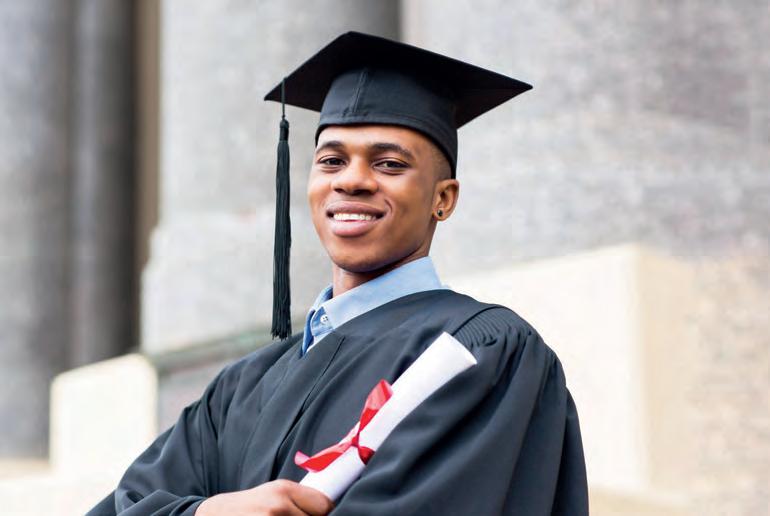

By ANISSA DURHAM
Word in Black
When was the last time you spoke to your child about sex?
For many parents and guardians, talking about the birds and the bees can be difficult, uncomfortable, and cringy. But for Black families, talking about sex carries an added urgency: Federal data shows Black youth account for a third of all U.S. STI cases, while Black women make up half of new HIV diagnoses.
At the same time, sex education in schools — already inconsistent and often abstinence-focused — faces growing political threats, from state laws restricting LGBTQ+ topics to stalled federal efforts to dismantle the Department of Education.
Indeed, before even having a conversation about sex, there’s more to be discussed.
Dr. Sara C. Flowers, vice president of education and training at Planned Parenthood Federation of America, says sex education is so much more comprehensive than just the act itself. It involves talking to children and young ones about consent, communication skills, gender identity, body image, and safe sex.
“Sex education also includes anti bullying, online safety, puberty, the biological elements of reproduction, sexual orientation, birth control, abortion, and all of these elements,” she says. “These are a broad suite of both knowledge and skills that (kids) learn about at home first.”
In the case of communication, Flowers says she’s seen parents teach their children the correct names of body parts. This sets the foundation for open communication, and it allows children to ask questions in a safe environment. At times, it may be difficult to answer a question, but offering to revisit the conversation or finding out together can model vulnerability — and their health is at stake.
In 2022, half of the reported cases of chlamydia, gonorrhea, and syphilis were for youth aged 15-24. And a third of all cases of these STIs were reported by Black or African American people. In the same year, Black women accounted for 50% of new HIV diagnoses, a little more than two times the rate for white women and two and a half times the rate for Hispanic women.

In a 2024 study, parents who spoke to their children aged 10-17 about sexuality were shown to reduce teen sexual risk behavior and increase comfort to continue these conversations. Adolescents and young adults’ sexual behavior puts them at risk for sexually transmitted infections and unplanned pregnancies, the report found.
However, sexual health education in schools is often not comprehensive enough and can depend on the whims of state government. 25 states and the District of Columbia mandate both sex education and HIV education, according to the Guttmacher Institute. Only 18 states require program content to be medically accurate.
Currently, 29 states require abstinence to be stressed when sex education is taught. But research shows an emphasis on abstinence doesn’t reduce rates of teen pregnancy.
Here’s What You Can Do
“Young people do want parents to start conversations,” Flowers says. “One of the things we hear regularly is parents wanting to sit down and start the conversation. It’s not a one and done. It’s an ongoing keep the door open type of situation.”
Here are three core elements of sexual health education Flowers says every child should learn from their parents — with different ways to approach the topic and resources from Planned Parenthood.
Consent is more than just saying yes or no in a sexual situation.
Parents can model consent by teaching their children bodily autonomy and asking for permission before touching them. For example, in the Black community, it’s common for young children to be expected to hug and kiss their elders, but Flowers says it shouldn’t be required.
As a mother raising a Black girl, Flowers says her priority is to make sure her daughter feels safe. Most parents want their children to feel safe and secure, she says, and it often starts with seemingly little things.
“We want our children to feel a part of our community and understand how it functions and what the expectations are,” she says. “I want my child to feel heard in a way that my generation might not have felt as heard.”
Setting boundaries may seem like a “new generation” thing to do — but in reality, everyone sets or lives within a set of boundaries. For example, closing the door when using the bathroom creates a physical boundary for the person using it and people nearby.
But learning how to set boundaries starts as children. Flowers suggests knocking on the door before
to answer their questions instead of finding out from schoolmates.
“I think reminding parents that young people want to hear from them is important, because we get in our own way sometimes, if we’re uncomfortable with something,” she says.
But it’s not always easy to talk to children and adolescents about safe sex. So, some parents leave it up to schools to teach their kids.
A lack of comprehensive sex education, which includes topics on consent and forming healthy relationships, is linked to higher rates of sexual violence. This is especially critical when statistics show that 1 in 4 Black girls will be sexually abused before the age of 18.
The Trump administration’s stalled efforts to dismantle the Department of Education, still pose a threat to existing sexual health education programs for adolescents.
entering a room or space your child is in. This reinforces that they are allowed privacy, even if they’re just brushing their teeth.
“I want her to expect their boundaries to be respected when she isn’t in my home,” she says about her daughter. “I want her to have manners, but I also don’t want her bodily personal space disrespected, and she gets to set that boundary.”
Communication isn’t just speaking or telling a child something. It involves a question and answer. Of course, it’s important to teach children manners, but not at the expense of their safety. Knowing when and how to approach your child about anything involving their body doesn’t have to be as complicated as it sounds.
It’s never too early to communicate with your child about their bodies. Flowers says it can simply be letting your little one know you are about to change their diaper. Or helping them understand what parts of their bodies are private and should not be touched by anyone.
Planned Parenthood has a list of resources broken down by age group to help you guide your child at every stage of their life. Even when its uncomfortable, taking the time to teach young ones about personal safety, reproductive health, and sex — lets them know you are available
“We know that sex education across the U.S. is already deeply fragmented and very dependent on where you live. Now, with this Trump administration attacking education broadly, it’s even worse,” Flowers says. “Young people’s health, livelihood, and safety are being threatened.”
Threats to safety were a problem before Trump took office, though. A report by the Centers for Disease Control and Prevention surveyed more than 20,000 teens between 2015-2019. It found Black female teenagers were more likely to say their first time having sex was unwanted compared to white teenagers. Overall, a younger age at first sex is associated with a greater likelihood that it was unwanted.
What does this mean?
Teaching young people about consent, boundaries, and communication, Flowers explains, isn’t something that should happen at 16. Even if previous generations took an approach that didn’t offer much education, it doesn’t mean we have to repeat those patterns.
“I see Black parents making a conscious decision to learn from the past and make an intentional choice about how to move differently,” she says. “I wish that other parents felt that they had the autonomy to do that because I want our kids to be free. I want our kids to have fun and laugh and experience joy.”
By ISAIAH SINGLETON
Rag & Bucket Company founder and CEO Q L Cammack describes his company as a celebration of individuality. Cammack added that his company was founded in 2023 with a passion for slow fashion and a deep respect for timeless quality, and to create one-of-a-kind fashion wear that is as unique as the people who wear it.
“Every piece we craft tells a story,” Cammack said. “From the careful selection of premium, textured fabrics to the thoughtful addition of satin linings that protect and nurture all hair types, each item is designed with the wearer in mind.”
Rag & Bucket recently displayed their first fashion show, “Identity Reborn” at the Darlington. The Atlanta Voice sat down with Cammack to discuss
The Atlanta Voice: The “Identity Reborn” Fashion show was this past weekend. How are you feeling?
Q L Cammack: I feel great. I feel blessed to be able to reach this milestone and to see it through, also excited that it’s over. It’s a good balance and I want to get some rest, but overall, just excited, overwhelmed with the support of everybody and the ones that dived in and helped to see everything through the end. It was a great experience.
AV: Talk to me a bit about the creation of Identity Reborn and the intention behind it.
QLC: The idea behind the show comes from self-evaluation. I took about two years of isolation, trying to figure out what my plan was and what I wanted. I was coming out of advocacy at the time, and had just moved from Chicago, so for me, it was a rebirth of my identity, because I was doing a lot of behind-the-scenes work for other people and helping people with their brandings. It was about creating a new movement. Even for
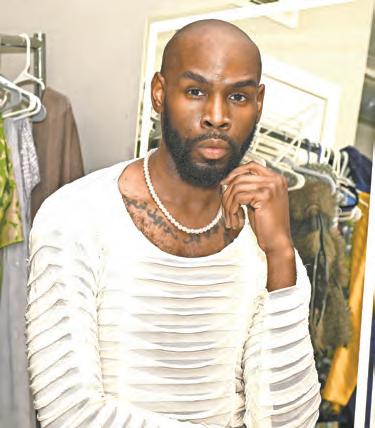
the people that was included in the show, giving them new opportunities to see their stuff in a different light. The overall purpose of the evening was to inspire and have people feeling that spark.
AV: What kinds of challenges did you face along the way in creating this fashion show?
QLC: The biggest thing was trying to keep control of my vision and trusting people with that vision. No one is going to chase your dream or vision like you. When you birth something, you want to keep everybody on the same page. Another thing is just the climate of the world and the economy.
AV: How do you describe your fashion style?
QLC: It’s menswear, but it is also gender nonconforming. I want people to feel free, limitless, without labels. I want people to be able to feel expressive in whatever they wear and feel seen. So, a lot of my stuff is nontraditional and reflects duality. It’s like a flow of life, and this collection was about healing my inner child without people putting labels on me and saying who I was; this is stuff that I would want to walk down the street proud to wear. It’s a love letter to fluidity and freedom.
AV: There’s been a lot of talk about “fast fashion”. Why don’t you prefer it?
QLC: Fast Fashion is like SHEIN and TEMU, and there’s nothing wrong with that because style is style, but I want everything I produce to focus on quality and be passed down to my nieces and my grandmother, and others. I want to be able to carry my pieces through generations. My biggest take on fast fashion is that it pulls from creatives like me and others, like I fund a lot of these things from my 9-5 job, and companies like Akira, Fashion Nova, etc., they steal our designs and then they mass produce them, and this happens a lot. I do feel, especially in the economy right now with inflation, we should support local artists or people who create.
AV: What kind of advice would you give to aspiring creatives and artists?
QLC: Go for it. You’ve got to be delusional because a lot of people will not see the vision or the end goal of what you have going on, and a lot of those things plant bad seeds. That’s why it has taken me so long, because of limited beliefs that I may have applied to myself, or other people have put on me. Also, it requires a lot of sacrifice. I thank God I’m in the position I am now, but when I first got started, I was working a typical underpaid 9-5, and I had to sacrifice and choose not to go to the club or buy that bottle, and instead buy fabric. Invest in yourself.
AV: What’s next for you?
QLC: Rest, I’m going to take the month off. I do have some shows lined up, so probably be doing some commission work. There’s some advocacy work that I want to do and tie into the clothes. I also have a show coming up. Definitely New York Fashion Week in September, and a show lined up here in Atlanta for October. I would like to put on another show here before summer ends.
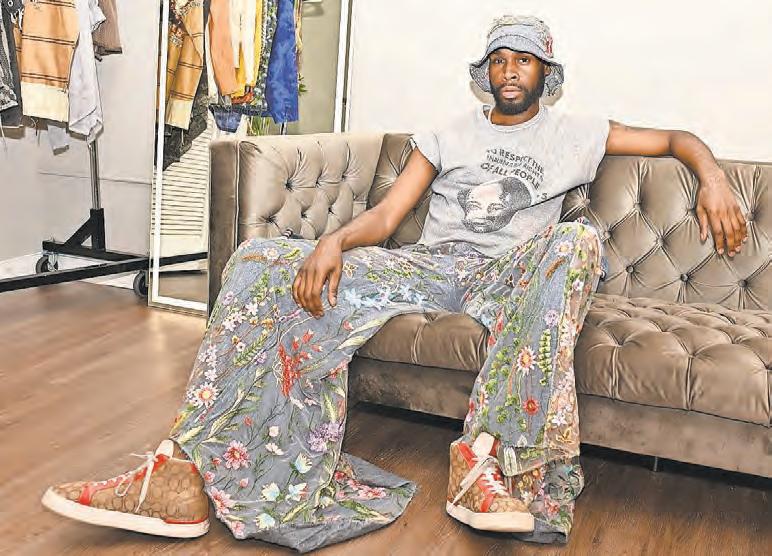

By DONNELL SUGGS
There are so many sushi dining options in metro Atlanta that it can sometimes be confusing to choose where to eat. Rock N’ Roll Sushi is a franchise serving some of the most interesting sushi on the city’s south and north sides. Founded in Mobile, Alabama, in 2021, the company prides itself on being an “American-style” sushi restaurant.
The Sweet Mango O’ Mine roll, which is served on a plate with mango lime sauce on it, was savory and sweet. It includes mango bits, green onions, avocado, and krab meat. The roll is topped with salmon and sesame seeds. Even though it’s available for a limited time, it is definitely worth giving a try.
According to the company’s district manager, Taylor Blackgrave, the VIP roll is one of the most popular menu items. It can be ordered baked or fried (we tried it baked), and it was the best sushi roll we tried during our visit.
The combination of spicy tuna, fried shrimp, cream cheese, and the pieces of seared tuna on top was a foodie’s dream, in my humble
opinion. The VIP Roll comes in a bit of aluminum foil, so if you order it baked and don’t finish it at the restaurant, it can easily be warmed up in the oven at home.
Editor’s Note: It warmed up perfectly. I had it in the oven for 5-7 minutes, and at 350 degrees.
The Sunset Strip roll was the brightest-looking sushi roll we tried. Served with a combination of shrimp tempura, cucumber, shrimp, krab stick, and eel sauce, the Sunset Strip roll has a little something for everyone.
“It has all the texture of traditional sushi,” Blackgrave said before adding that the Sunset Strip roll was also a dairy-free option for those who partake.
The most interesting-looking and flavorful sushi roll we tried during our visit was the Punk Rock roll.
Topped with a salad of strawberries, green peppers, and avocado, it catches your attention as soon as it is set down on the table. It’s weird to describe a dish as pretty, but it is a pretty plate of food. It’s also tasty.
Topped with seared tuna, the Punk Rock roll also has spicy tuna, fried shrimp, and cream cheese.
Of all the delicious food we tried, the service is one of the best parts of our experience at Rock N’ Roll Sushi. On our visit to the Stockbridge location, Blackgrave was extremely helpful in identifying which sushi rolls to try. She was also quite knowledgeable about the food at Rock N’ Roll Sushi, including the fried rice and what drinks to pair with the food.
Super Sushi Fan Alert
Rock N’ Roll Sushi is offering ‘Sushi Superfans” a chance to get free sushi for a year with its annual sweepstakes. It breaks down like this: $1,040 in Rock N’ Roll Sushi or $20 weekly for 52 weeks.
The contest runs through June 18, which happens to be National Sushi Day and the day the winner will be announced. The contest is open to anyone who signs up, whether they are a Rock N’ Roll Sushi returning customer, a first-time customer, or don’t plan to dine there at all unless they win.
There are eight Rock N’ Roll Sushi locations in Georgia, including in Locust Grove. Macon, Duluth, Rome, Canton, Bonaire, and Woodstock.
By DENNIS MALCOLM ByRON AKA ALE SHARPTON
If there is one car that sparks conversation while navigating through the streets, Subaru’s WRX is one of the autos at the top of the list. While the carmaker is renowned for reliability and taking on various terrains, this rally-inspired sport sedan is more aggressive in muscular styling and track-capable performance, balanced by everyday practicality. Manufactured in four trims, my tS review car boasts a sixspeed manual transmission which attracts automotive traditionalists who want total control regarding performance. In the eye candy department, I recommend the Crystal White Pearl with black accents complementing its muscular frame that adds to the admiration when on the road. More exterior upgrades include the matte gray 19-inch alloy wheels, LED fog lights, and blacked-out rear lip spoiler, shark-fin antenna, and mirrors. The Brembo performance braking system even gets some visual love
featuring gold-painted calipers.
Under the hood, a 2.4-liter turbocharged BOXER engine delivers 271 horsepower and 258 lb.-ft of torque enhanced by the Active Torque Vectoring, pair well with Subaru’s renowned Symmetrical All-Wheel Drive, collectively boosting the grip, maneuverability and overall driving experience regardless of the road conditions. The addition of electronically controlled adaptive dampers tuned by Subaru Tecnica International (STI) with multiple drive modes are applauded as well.
The Recaro front seats, clad in Ultrasuede highlighted with lines of gorgeous electric-blue leather, offer both exceptional support and aesthetics. Blue contrast stitching continues through the dashboard, center console, and steering wheel, giving the cabin a customization further justifying the sports sedan designation. The WRX tS also includes practical touches like dual-zone climate control; a rear seat armrest with cupholders; heated mirrors and seats; and a rear seat reminder which is ideal to avoid


tempted break-ins.
Infotainment is handled by an 11.6-inch STARLINK touchscreen that supports wireless Apple CarPlay and Android Auto, with Bluetooth connectivity, plus a fully digital 12.3-inch gauge cluster. The Harman Kardon audio system, one of my top sound system brands, makes every excursion a traveling concert with 11 speakers and 504-watt amp.
Subaru’s dedication to safety remains intact, with the standard EyeSight Driver Assist Technology package boasting features like adaptive cruise control, lane keep assist,
blind-spot detection and rear cross-traffic alert to balance out all the racing qualities of the WRX.
All in all, while the gas mileage takes a hit averaging only 22 miles per gallon, the 2025 Subaru WRX tS makes up for it as an all-weather sports sedan that will attract purists who demand a stick shift and total command of the road in thrilling fashion.
Fuel Economy: 19 city/ 26 highway/ 22 combined
Price: The 2025 Subaru WRX tS is $47,705 For more information, visit Subaru.com.
By DONNELL SUGGS
The 2026 FIFA World Cup is a little over a year away, and Atlanta will play a large part in hosting the quadrennial international event for North America. On the other hand, the FIFA Club World Cup is only a week away, and a match between English Premier League giant Chelsea and Major League Soccer’s LAFC at Mercedes-Benz Stadium is scheduled for Monday, June 16.
The FIFA Club World Cup will bring 32 of the largest and most successful football clubs in the world to Atlanta, Los Angeles, Cincinnati, Seattle, New Jersey, Miami, Philadelphia, Orlando, and Washington, D.C. to settle which is the best on the planet.
Atlanta will host several matches, and other cities in Georgia look to participate in the madness that is international soccer competition.
Enter Macon, the new home for LAFC training during the FIFA Club World Cup. Macon will also be the training site for a country’s national team during the FIFA World Cup in 2026, according to Macon-Bibb County Mayor Lester Miller.
“It’s a great day to be in Macon-Bibb County,” Miller said from a stage inside Hawkins Arena, on the campus of Mercer University. The arena is home to the Mercer Bears men’s and women’s basketball programs. “Macon-Bibb County is taking its place on the world’s stage like never before.”
On Tuesday, June 3, representatives from Mercer University, Visit Macon, the city’s and Bibb County’s visitors bureau, and Miller held a press conference to announce Macon’s contribution to the 2025 FIFA Club World Cup and 2026 FIFA World Cup. Even though the FIFA Club World Cup trophy wasn’t on stage at Hawkins Arena the way it was in Mercedes-Benz Stadium in April and March, Macon city officials and Visit Macon owned the moment.
“I am a very strong believer in what sports can do for a town,” Mercer University Athletic Director Jim Cole said.
The city of Macon, which is the county seat for Bibb County, the 16th largest county in the state of Georgia (population 157,284), is attempting to make the most of this once-ina-lifetime World Cup bid. It is reminiscent of when the 1996 Summer Olympic Games were announced in Atlanta in 1990. The city of Atlanta was changed forever. Maybe the same doesn’t happen for Macon, but this is a start.
“For the next several weeks, LAFC will call Macon home,” said Miller, who at two moments during the press conference held up a black LAFC jersey. “We want everyone to see Macon as the place it can be.”
Macon saw $11 million in economic impact
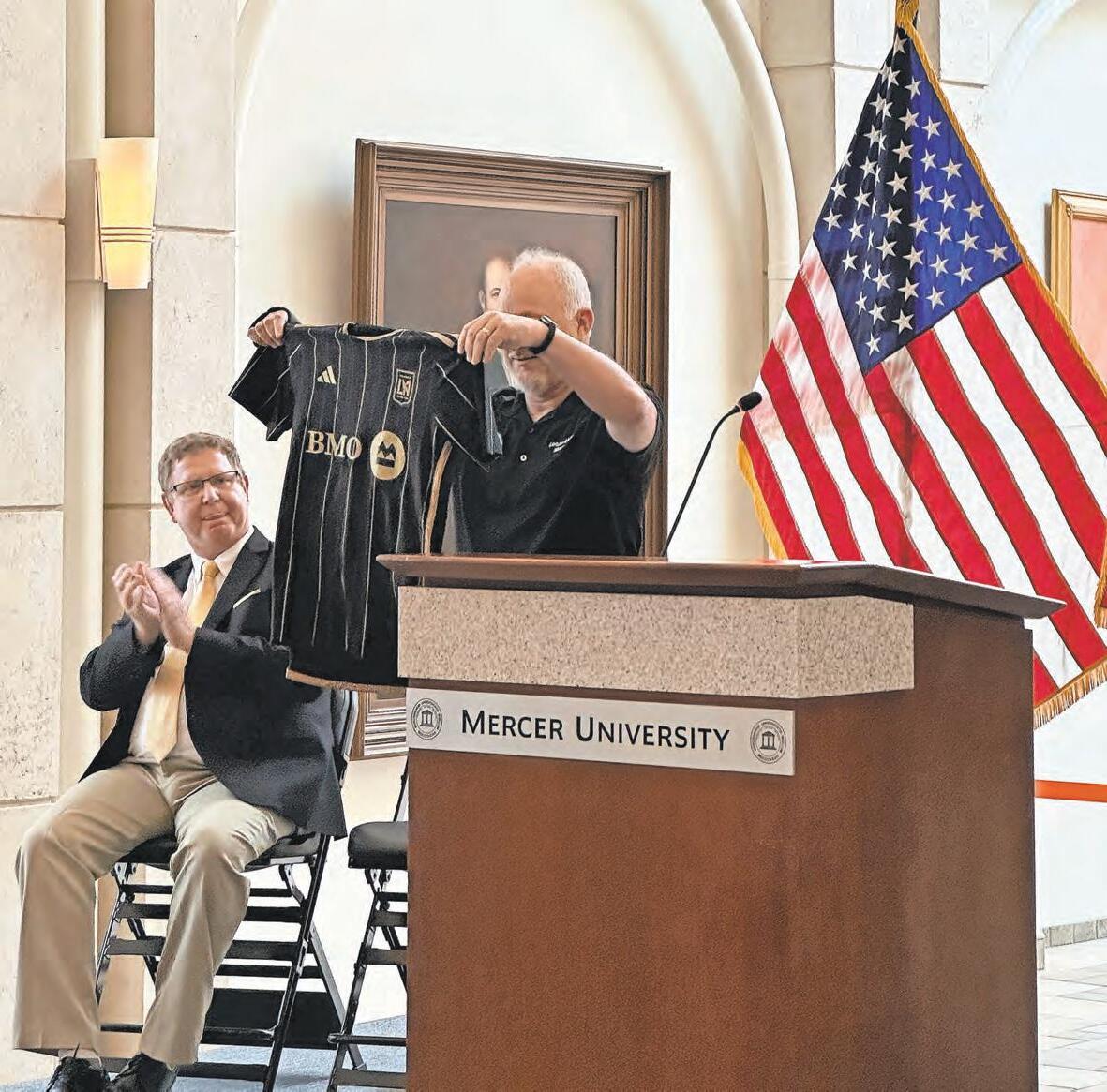
from sports in 2024 and has already seen $12.5 million through the first five months of 2025, according to Gary Wheat, President & CEO of Visit Macon.
According to a release by Mercer University, there have been improvements to local parks, recreation centers, and pickleball facilities. Macon is home to the country’s largest indoor pickleball facility, Rhythm and Rally.
“We have made major strides in strengthening our sports tourism efforts, and Tuesday’s announcement will truly attract the world’s attention,” said Wheat. “We have seen
recreational opportunities expand greatly for the people that live here, attract new tournaments and sports here, and so much more.”
Miller credited the collaboration with all parties involved with making the city better the reason why he was holding the LAFC jersey and celebrating on Tuesday.
“By working closely with great partners like Visit Macon and Mercer University, we are able to bring thousands of new people to our community,” Miller said.
Mercer University’s campus has several first-class athletic facilities and fields, and
Cole believes there can be more opportunities to have professional clubs and franchises visit Macon’s hometown university.
“We are always looking for the opportunity to showcase our facilities and we cannot wait to host LAFC,” Cole said. “It’s wonderful to have them here and to have our athletes witness a first class club.”
Nothing like the FIFA Club World Cup to kick things off.
“We’re going to cheer on LAFC as our hometown team throughout the FIFA Club World Cup,” Miller said.
By NOAH WASHINGTON
As virtual reality continues to push the boundaries of entertainment, Sandbox VR is Atlanta’s gateway to the digital world, blending video games with interactive elements and athleticism.
C, Sandbox VR offers an immersive experience where guests step into narrative-rich games powered by motion capture technology.
With multiple titles to choose from, The Atlanta Voice had the opportunity to play two of the nine currently available experiences at The Interlock location. The first, Curse of Davy Jones, is geared toward younger audiences or players easing into VR. In this adventure, you and your team become swashbuckling pirates seeking to secure a bounty from Davy Jones’ locker while battling skeleton pirates in his service. When you enter a Sandbox VR experience, you are equipped with motion capture gear on your hands and feet, looking as if you are about to walk onto the set of a Marvel Movie.
Nazir Huynh, a junior at
Kennesaw State University studying game design and working at Sandbox VR, sees the job as more than just a paycheck.
“I was looking for something aligned with my major, and I saw the job listing on Indeed,” Huynh said. “It felt too good to be true at first— but it was real.”
Since joining Sandbox VR in July 2023, Huynh has played every experience offered at the venue. His favorites include the competitive and popular Squid Game, based on the Netflix TV show, and Amber Sky, a fast-paced, cinematic shooter.
To fully immerse yourself in the experience, you’re equipped with headphones and a VR headset that replaces your entire field of vision with the world you’re about to enter.
“Amber Sky was the first game I played during training,” he said. “It’s intense but not overwhelming. The graphics are amazing, and anyone can jump in.”
The second game, which Huynh described as on the opposite end of the intensity spectrum, was Deadwood Valley: PHOBIA, a horror-filled zombie shooter. In this

experience, you play a special forces operative tasked with saving fellow soldiers trapped in a zombie-infested asylum in a mission that tests nerves as much as skill. This is Sandbox’s first dive into psychological horror.
For Huynh, it’s not just the game design that keeps him engaged— it’s the people. Watching guests come alive in virtual spaces is part of the magic.
“I’ve seen little kids get excited, adults acting like kids again, even people with disabilities enjoy it,” he said. “Sandbox is really inclusive—we’ve had guests in wheelchairs, with one arm, or those who get motion sickness. We try to make it accessible to everyone.”



Principal Information Security Engineer (mltpl pos’s), US Bank, Atlanta, GA to provide security insights during the dsgn phase. Pos reqs a Bachelor’s deg in CS, Computer Engg, Info Sys, or a rltd field, followed by 5 yrs in a progressively respsbl S/w Dvlpr, or rltd, occupation. Must incl 3 yrs of exp w/ each of the following: 1. Automate security tstng & integrate security checks into CI/CD pipelines; 2. AWS, Azure, GCP (Google Cloud Platform), & Prisma Cloud; 3. Docker & Kubernetes; 4. Akamai API Gateway, Akamai Neosec, Apigee, GraphQL, & REST APIs; and 5. Terraform, JSON, JWT, & YAML. Teams may work from home & the office. Pay Range: $149,760 - $164,100. Apply online https://careers.usbank.com/global/en or email recruiting.excellence@ usbank.com, incl job req 2025-0008503 in subject line.



Each party can include up to six guests, and the game difficulty adjusts based on your group size. Photos and videos of gameplay are available for download once you have completed your session. After each game, you’ll likely be sweating from all the kneeling, ducking, and running— athletic wear is recommended. But whether you’re a first-timer or a seasoned gamer, Huynh believes there’s something for everyone.
“Some people want to shoot zombies. Others want something light. That variety is what makes this place special.”
Senior TIBCO Engineer (mult. pos.), US Bank, Atlanta, GA to design & code various apps using TIBCO Container Ed, Kubernetes, & Azure Cloud to provide new func of USBank Mortgage Org apps. Pos reqs a Bach deg in Comp Sci, Comp or Electr Engr, Info Tech, or a rel field, followed by 5 yrs of prog resp exp as a SW dev or a rel occ. Must incl 2 yrs of exp w/ each of the following: TIBCO Business Works 5.7, TRA-5.6, TIBCO Designer 5.6, EMS 6.1, TIBCO admin-5.6, TIBCO-AMX-SG-3.1, TIBCO-AMX-ADMIN-3.1.5, Hawk, TIBCO B.E., SVN, JAVA, XML, XSLT, SOAPUI,
2025-0008496 in subject line.























































